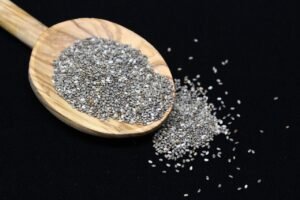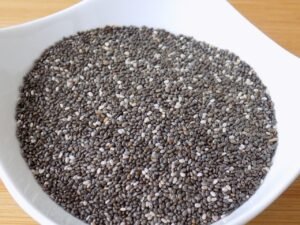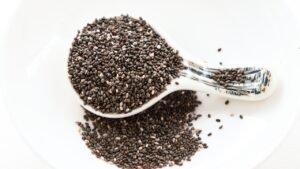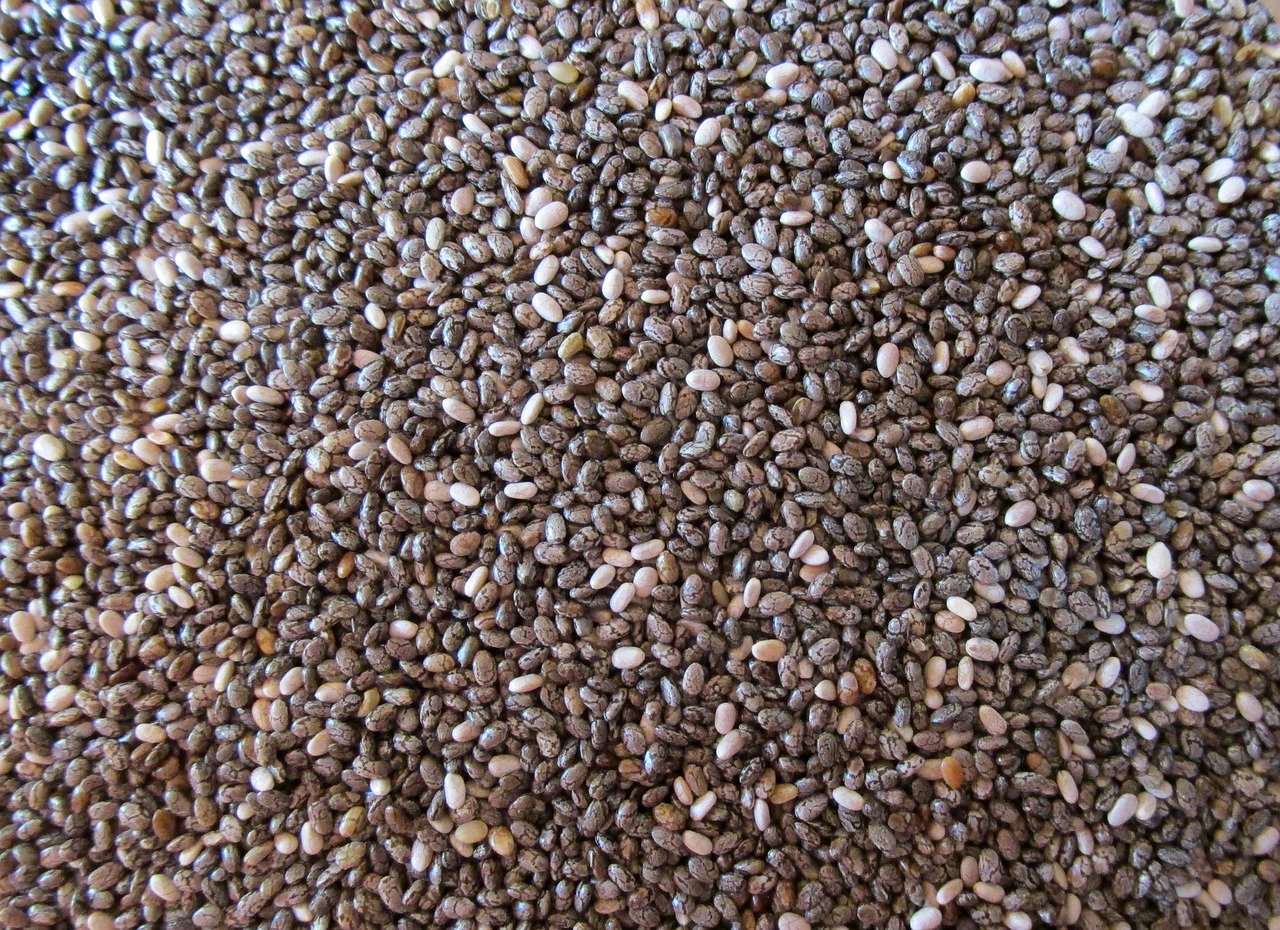Chia seeds are rich in protein, vital minerals, antioxidants, and fiber, as well as omega-3 fatty acids. They could aid with blood pressure reduction, blood sugar regulation, and improved digestive health.
These are very adaptable seeds. They can be soaked and then added to oatmeal, cooked into pudding, mixed into baked items, or just sprinkled over yogurt or salads.
They can also be used to thicken sauces or as a substitute for eggs due to their capacity to absorb moisture and create a gel.

Nutrition facts
One ounce (28 grams) of chia seeds has 138 calories.
They consist of 6% water, 46% carbs (of which 83% are fiber), 34% fat, and 19% protein by weight.
One hundred grams, or 3.5 ounces, of chia seeds contains the following nutrients:
• Calories (486).
• Water: 6 percent.
16.5 grams of protein
Grams of carbohydrates: 42.1
There is no sugar present.
34.4 grammes of fiber
3.07 grams of fat
3.33 grams of saturated fat
2.31 grams of monounsaturated fat
23.67 grams of polyunsaturated fat
Omega-3: 17.83 grammes
Omega-6: 5.84 grammes
Trans: 0.14 g
Notably, chia seeds don’t contain gluten.
Carbs and fiber
The fiber in chia seeds makes up over 80% of their carbohydrates.
The 11 grams of fiber included in one ounce (28 grams) of chia seeds is a substantial amount, accounting for 25% of the Reference Daily Intake (RDI) for men and women, which is 38 grams and 25 grams daily, respectively.
There is soluble and insoluble fiber in chia seeds.
Fat
Chia seeds are special because of their high omega-3 fatty acid content, which is heart healthy.
Alpha-linolenic acid (ALA), an omega-3 fatty acid, makes up around 75% of the fat in seeds, whereas omega-6 fatty acids make up about 20%.
These seeds surpass flaxseed as the most well-known plant-based source of omega-3 fatty acids.
According to some scientists, your body will experience less inflammation if you consume more omega-3 fatty acids than omega-6 ones.
Reduced risk of premature death. It also reduces the chance of developing a number of chronic illnesses, including cancer, heart disease, and inflammatory diseases.
The omega-3 fatty acids (EPA and DHA) in chia seeds, however, are not nearly as powerful as those in fish or fish oil, gram for gram.

Protein
Chia seeds are higher in protein than most cereals and grains, with a 19% protein content, comparable to other seeds. Consuming a lot of protein helps people feel fuller after meals and eat less overall.
Interestingly, these seeds provide all nine essential amino acids, making them a superior plant-based source of protein. Experts do not advise kids to eat them just for protein, though.
Vitamins and minerals
Chia seeds are a good source of minerals; however, they are not a good source of vitamins.
Among the most common minerals are:
- Manganese. Manganese, which is vital for metabolism, growth, and development, is abundant in whole grains and seeds.• Phosphorus. Phosphorus supports bone health and tissue maintenance and is typically found in diets high in protein.• Zinc. Copper is essential for heart health and is frequently deficient in the contemporary diet.
- Magnesium. Magnesium is an element that is frequently deficient in the diets of Westerners and is vital to numerous body functions.
• Calcium. Your body has the most calcium, which is necessary for healthy bones, muscles, and neurons.
It’s possible that the phytic acid in seeds will hinder the absorption of certain minerals, such iron and zinc.
Other plant compounds
These seeds have Chlorogenic acid is one of the many beneficial plant chemicals . This antioxidant may lower the blood pressure.
• Acid caffeine. This material helps reduce inflammation in your body and is abundant in many plant-based diets
• Quercetin. This potent antioxidant may lower your chances of osteoporosis, heart disease, and several types of cancer.
• Ketofenrol. Researchers suggest that this antioxidant may reduce the risk of cancer and other chronic illnesses
Health benefits of chia seeds
Below is a list of their primary health benefits.
Elevation of omega-3 fatty acids in blood
For your body and brain, omega-3 fatty acids are crucial, and chia seeds are a great source of these ALAs.
Your body cannot use ALA directly; it must first be transformed into the active forms, such EPA.
Chia seeds have been found to increase blood levels.

Improved blood sugar control
It is essential for optimum health to have normal blood sugar levels. Animal tests have shown that chia seeds enhance blood sugar regulation and lower insulin resistance, which are two major risk factors for heart disease, type 2 diabetes, and metabolic syndrome.
According to human studies, when bakers use chia seeds to make bread, the blood sugar response is lower than when they use more conventional ingredients.
Lower blood pressure
An important risk factor for long-term conditions like heart disease is high blood pressure.
For those who already have high blood pressure, chia flour and seeds have both been shown to reduce it.
Increased fiber intake
Most people don’t consume enough fiber in their diets. Increased consumption of fiber is good for better gut health and also decreased risk of many illnesses.
Chia seeds have a remarkable ability to absorb water, which makes meals go farther down your digestive tract and makes you feel fuller and eat less.
Adverse effects and individual concerns
There have been few side effects from eating chia seeds. You should drink more water when you eat chia seeds, especially if they are not soaked. Drinking a lot of water prevents you from any negative digestive effects.
Phytic acid content
Phytic acid is present in chia seeds, as it is in other seeds. Plant-based phytotic acid forms bonds with minerals. And prevents them from being absorbed through diet.
Blood-thinning effect
Omega-3 fats, which are found in fish oils, can thin the blood. Consult with your doctor before adding chia seeds to your diet.

1 thought on “Chia seeds nutritional value”